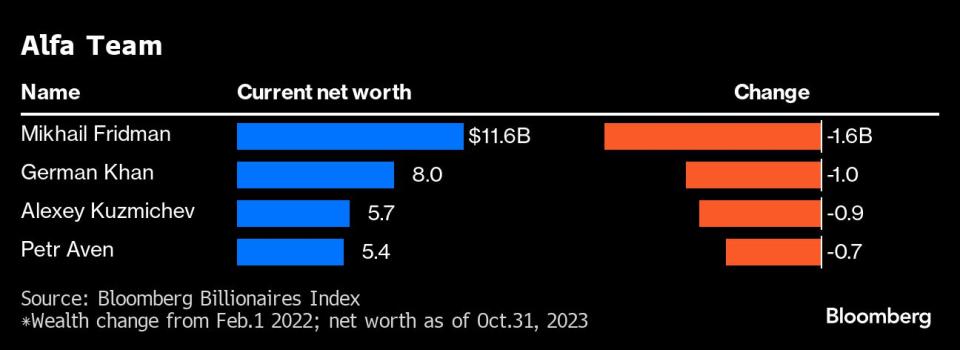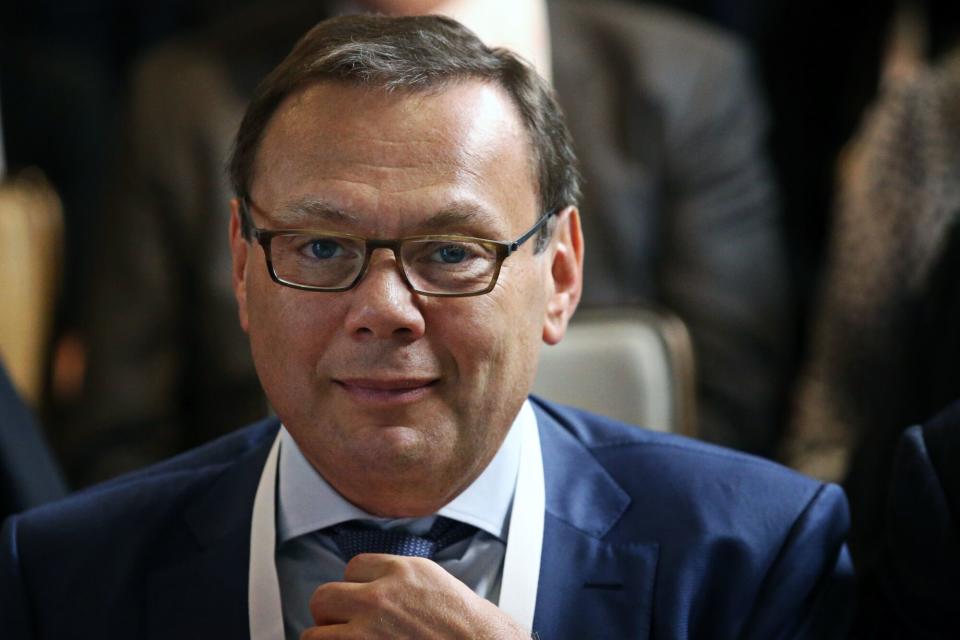Squeezed by Sanctions, Some Oligarchs Are Heading Home to Putin’s Russia
(Bloomberg) -- Mikhail Fridman and Petr Aven epitomized the Russian oligarchs who used their fortunes to integrate into the global economy and shake off association with President Vladimir Putin’s regime. Now the wheel of fortune is turning full circle.
Most Read from Bloomberg
Israel Latest: Biden Urges ‘Pause’ So Hostages Can Leave Gaza
Real Estate Industry Takes Fresh Hit With Verdict on Commissions
Fed Signals Yield Rise Reduces Need to Hike, But Door Still Open
Markets Rally as Powell Says Fed Has ‘Come Far’: Markets Wrap
Fridman has fled to Moscow from London via Israel, bitterly unhappy with life as a sanctioned businessman in Britain since Putin ordered Russia’s invasion of Ukraine. Aven may also have to weigh a return to Russia from Latvia, where authorities are threatening to revoke his passport.
Russia’s invasion of Ukraine changed everything for them and other billionaires who prospered under Putin until the US and Europe imposed sweeping sanctions aimed at isolating the Kremlin leader and bringing his economy to its knees. The penalties largely failed to achieve those goals so far, though they destroyed the standing of many wealthy Russians abroad who remained silent or avoided direct criticism of Putin over the war.
While sanctions have hurt their lifestyles and made them business pariahs in the West, the personal impact pales in comparison to the death and destruction inflicted on Ukraine by Putin’s war machine since the February 2022 invasion. Though their assets outside Russia may be frozen, the country’s billionaires remain hugely wealthy.
The day after Russian troops crossed into Ukraine, Fridman and Aven left Moscow for London. Fridman, who was born in Ukraine, decried the conflict as a “tragedy” and said “war can never be the answer” in a letter to staff at their LetterOne investment company, which avoided direct criticism of Putin.
Fridman’s charity organization, the Genesis Philanthropy Group, announced it would donate $10 million to Jewish organizations supporting refugees in Ukraine.
None of it helped. Fridman and Aven were sanctioned by the European Union within days of the invasion. Their LetterOne and Alfa Group partners German Khan and Alexey Kuzmichev were sanctioned in March 2022, on the same day the UK put all four on its sanctions list.
The EU said Aven was “one of Vladimir Putin’s closest oligarchs,” called Fridman an “enabler” of the president’s inner circle, and described Khan and Kuzmichev as among “the most influential persons in Russia.” All four have been challenging their designations in legal actions, so far without success.
Khan quit London and returned to Moscow within months of the invasion. Kuzmichev, who was based in Paris, was detained for questioning in France on Monday over alleged tax evasion and money laundering, as well as international sanctions violations, and his home was searched as part of a preliminary investigation.
The day after it emerged Fridman was in Moscow, the speaker of Russia’s lower house of parliament told lawmakers that those who’d left the country and criticized it from abroad should be sent to remote prison camps or to work in mines. “We don’t need them, they must understand that,” Vyacheslav Volodin, a close Putin ally, said.
Putin told reporters Oct. 13 that those who’d violated Russian law “must be responsible for this,” in answer to a question about the return of Fridman and others from abroad.
“If in the minds of the overwhelming majority — not some part of some elite but the overwhelming majority of people — a person behaved immorally towards Russia, then he or she will certainly feel it upon returning here,” Putin went on. “How could it be otherwise?”
It’s a far cry from the heady optimism of two decades ago when Fridman signed a $6.2 billion deal with BP to create Russia’s third-largest oil producer, TNK-BP, in what was then the biggest foreign investment in Russia. The joint venture was blessed personally by Putin and UK Prime Minister Tony Blair, who both attended the ceremony during a state visit to London by the Russian president in 2003.
The business soured in disputes over operational control of TNK-BP that eventually led Russian state-owned Rosneft to buy out the two sides in a $55 billion deal nearly a decade later. Fridman, Aven and their partners came away with $14 billion from the sale that they used as a springboard for investments to complete their journey from Russia’s wild early capitalism into Europe’s business elite.
Fridman, Aven and another sanctioned billionaire, Vladimir Potanin, the largest shareholder in MMC Norilsk Nickel PJSC, are the only tycoons still active in business among the original oligarchs who bankrolled Boris Yeltsin’s re-election to the presidency in 1996, defeating his Communist challenger. Aven insisted it’s “absolutely untrue” the group’s rapid rise to wealth was due to political favors.
When Putin came to power in 2000 and later jailed another of their number, Mikhail Khodorkovsky, who’d financed opposition parties, Russia’s billionaires survived by obediently staying out of politics.
Many insisted in response to international sanctions that they have no influence over the president’s decision-making. At the same time, opposing Putin on the invasion of Ukraine carried huge personal risks for them and their families.
Oleg Tinkov was one sanctioned billionaire who did condemn Russia’s “insane war” in April last year and within days sold his family’s stake in the digital bank he founded to Potanin. Tinkov, who later renounced his Russian citizenship, was removed from the UK’s sanctions list in July.
At least initially, Fridman didn’t plan to return to Russia. He left London in September for Israel, complaining it was “impossible to live in the UK under sanctions,” then flew to Moscow days after the Oct. 7 Hamas attack in Israel that triggered the war in Gaza.
“I was given no choice, I was squeezed out,” he said by phone about his decision to leave the UK. “Today, the fact that we invested money in England looks like a colossal mistake.”
On Oct. 27, a court in London sided with the government in refusing his request for a £30,000 monthly management fee as well as payments for phone lines, TV equipment and staff costs for the upkeep of his north London mansion, ruling it wasn’t for “basic needs” but to enable Fridman “to continue enjoying the lifestyle he had” before sanctions.
It’s clear that Fridman, 59, chafed under the restrictions, apparently unable to come to terms with his diminished status after years of rubbing shoulders with the rich and powerful in Britain.
“I have a huge house and garden and the British authorities didn’t allow me to hire either a cleaner or a gardener,” he said. “I had to be at home every night and check in at a police station twice a week. I also couldn’t use my car and had to use public transport, and my house is far from the metro. I was restricted even in paying for medical services!”
Aven, 68, holds Latvian citizenship and owns a property in the Baltic state. He moved there from the US after leaving Britain last year when investigators began checking for sanctions violations in money transfers made for expenses and maintenance of his UK home.
That included an early-morning search of the property in May 2022 by about 30 officers that amounted to “pyschological pressure,” he said. At the airport in London in July that year, Aven said police quizzed him for three hours and asked at one point why he and his partners had invested billions in the West and based their head office in England.
“By mistake!” Aven said he retorted.
Fridman and Aven are convenient targets because “they’re rich and this is wildly annoying for everyone,” said Yevgeny Chichvarkin, a London-based critic of Putin who co-founded Russian mobile handset retailer Euroset Holding NV and left Moscow in 2008 when authorities began a criminal investigation against him that was later closed. While there’s a perception that “big money is linked to power,” sanctions are a “demonstrative flogging that have nothing to do with the fight against Putin” and help drive people back to the Russian leader, he said.
Fridman and his three partners all resigned from the board of LetterOne after being sanctioned. The Luxembourg-based company has seen its net assets decrease by almost a third to $18.9 billion as “the war, sanctions and wider economic environment has provided a challenging backdrop” for its businesses, according to its 2022 annual report.
Fridman, Khan and Kuzmichev became friends as undergraduates in Moscow where they made money selling scarce theater tickets to fellow students. In 1989, as the Soviet Union neared collapse, they created a trading company to sell electronic goods and other consumer items.
In 1990, they founded Alfa Bank, now Russia’s largest private lender. Aven joined them in 1994 soon after leaving his post as Minister of Foreign Economic Relations in a government of young reformers striving to revive the collapsed post-Soviet economy under Yeltsin.
Their Alfa-Group holding company now has stakes in assets ranging from banking to supermarkets with a total of some 400,000 employees across Russia and other ex-Soviet states.
Ukraine nationalized Sense Bank JSC, co-owned by Fridman and Aven, in July. Authorities in Kyiv started a criminal probe against Fridman in August under suspicion of organizing a criminal group involved in fraud, forgery and tax evasion, indicating they may seek his extradition from the UK.
In August, too, more than a year after the EU and the UK acted, the US Treasury sanctioned Fridman, Aven, Khan and Kuzmichev. The US had imposed full blocking sanctions on Alfa Bank and other leading Russian lenders in April last year, some six weeks after Putin ordered the invasion of Ukraine.
Fridman and Aven had announced plans to offload their stakes in Alfa Bank, which are held through a Luxembourg holding company, but now Fridman seems less categorical. “Ten months ago we started the process of exiting Russian assets, but still haven’t received permissions from European regulators,” he said. “When and if we get them, we will once again weigh the pros and cons.”
He earlier told Bloomberg that he regards his return to Russia as short-term and that he intends to spend most of his time in Israel when the war ends.
Like Fridman, Aven doesn’t understand why he’s been sanctioned over the war. Western business people and politicians, he said, were responsible “for strengthening the current Russian regime definitely no less than the so-called Russian oligarchs.”
Most Read from Bloomberg Businessweek
©2023 Bloomberg L.P.








